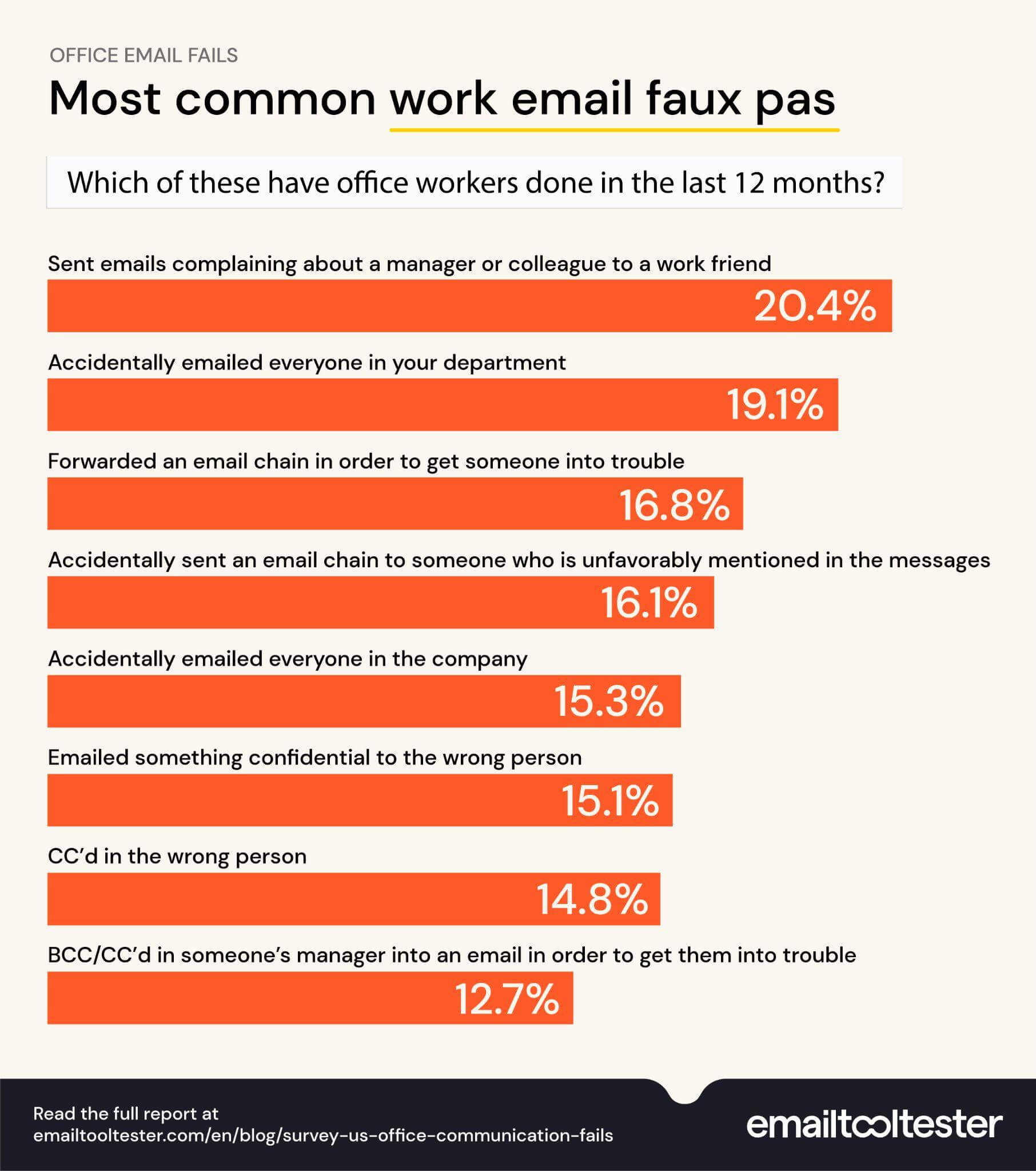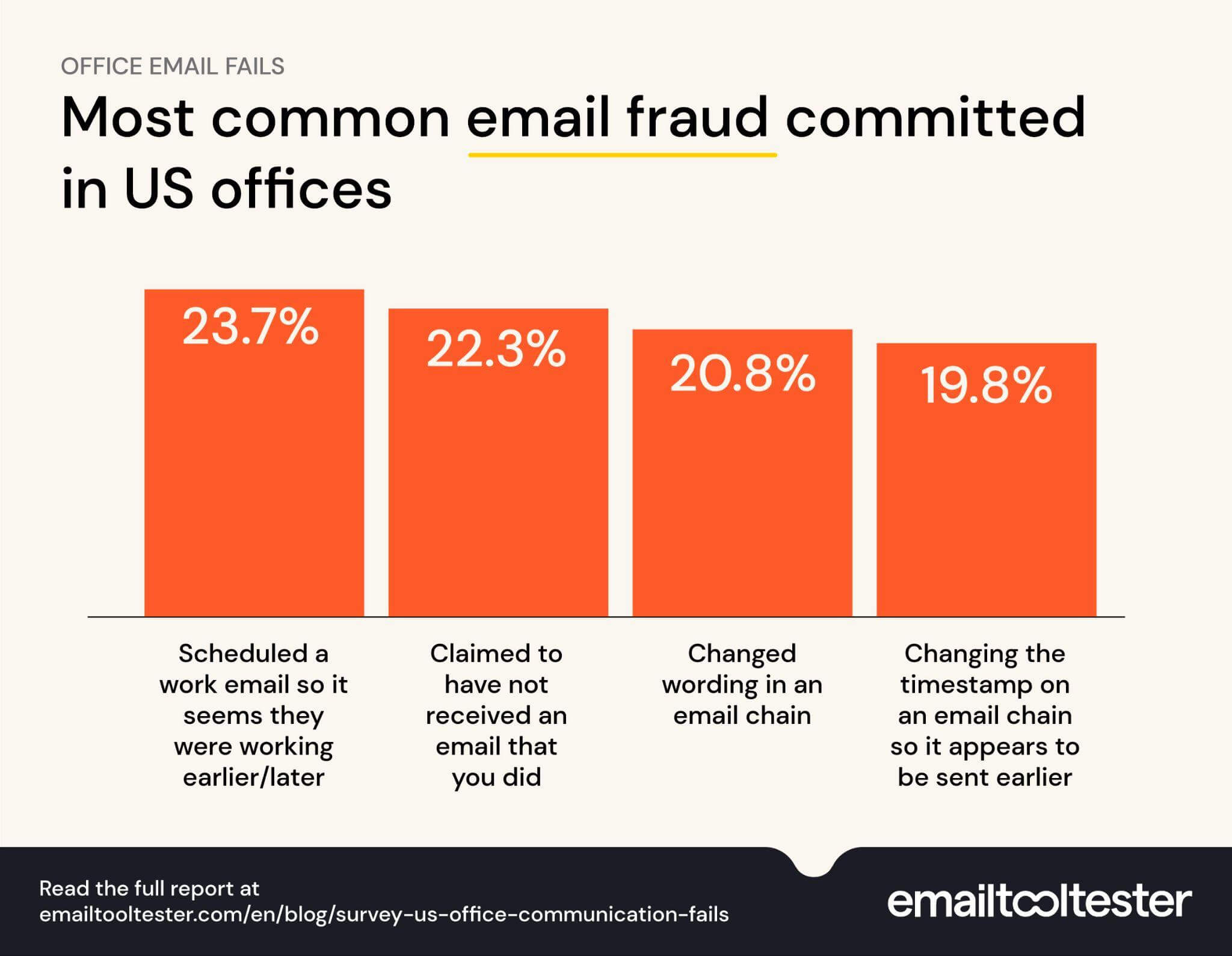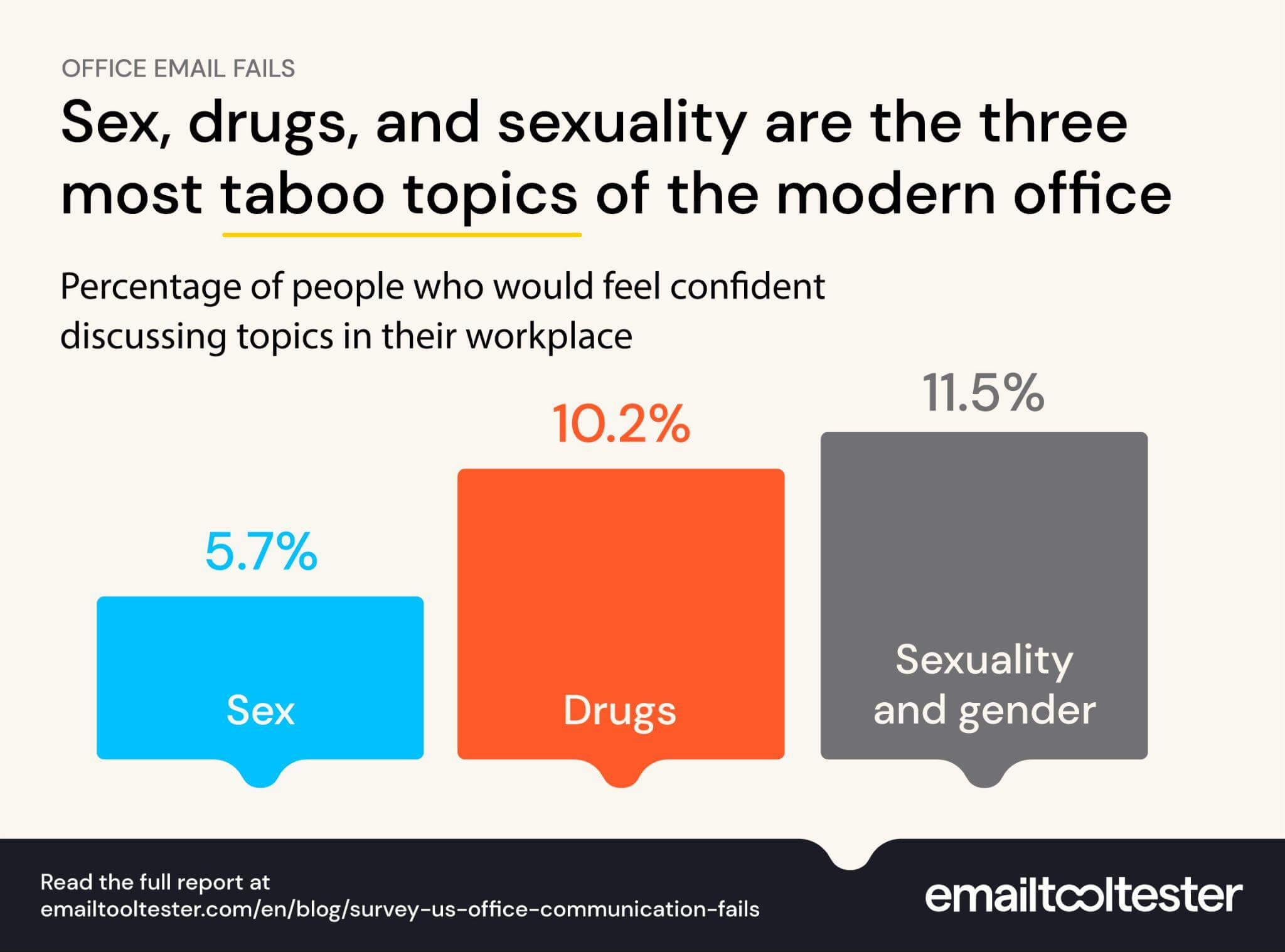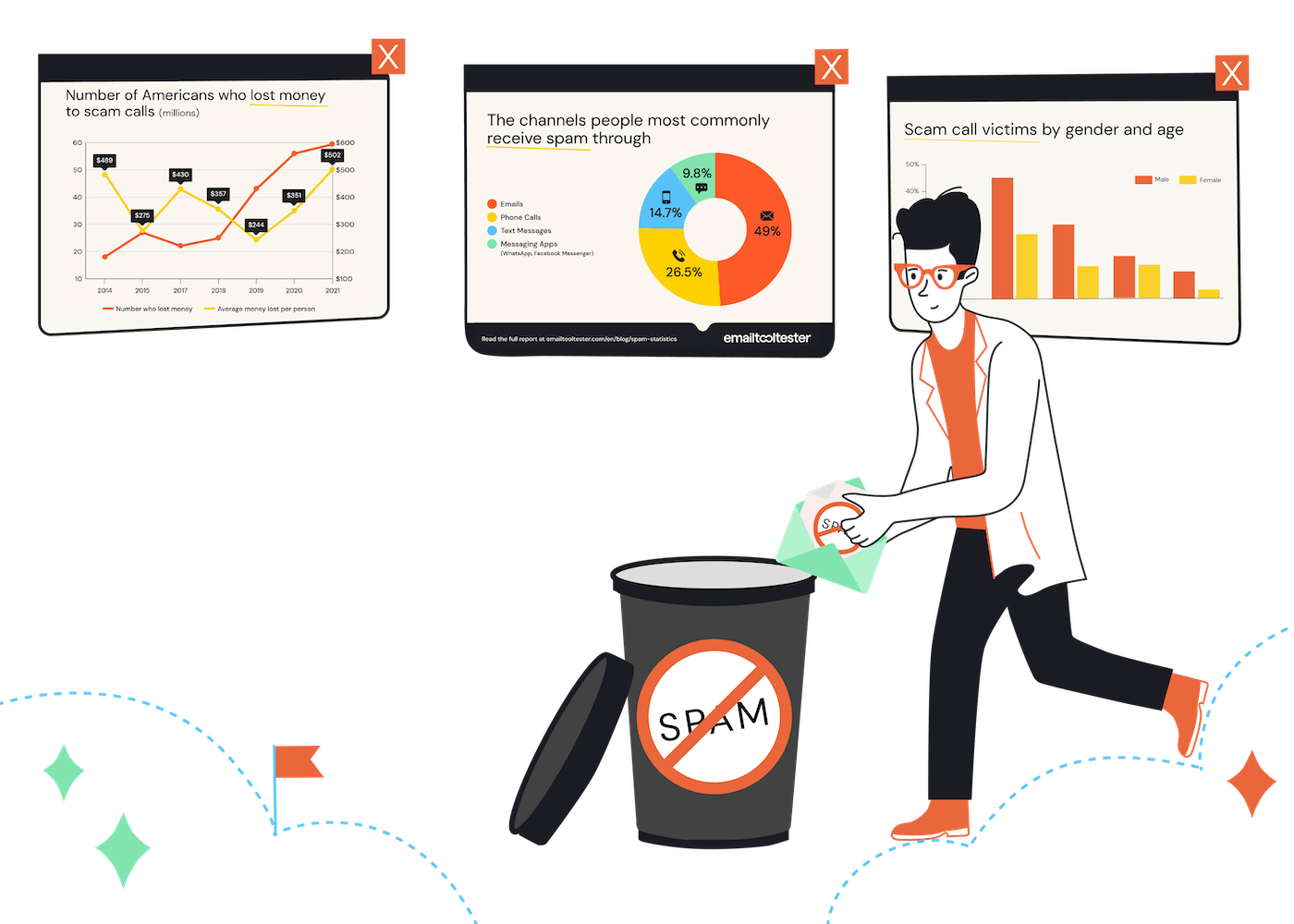With many businesses using email as the main form of communication between employees, customers and suppliers, communication etiquette can be a contentious issue, particularly when it comes to what different generations feel is acceptable and not.
To understand how often office communication faux-pas are committed in the workplace, we surveyed 1,043 American workers to find out more.
Key findings
- More than one in six (16.8%) have forwarded an email chain deliberately to get a colleague in trouble, with millennial men aged 25-34 the most likely to do so.
- Almost one in five (19.1%) workers have accidentally emailed everyone in their department, with 16.1% admitting to sending an email chain to a person who is unfavorably mentioned in the previous message.
- Almost one in five (18%) admit to using their work technology, such as phones or laptops, to look at x-rated content.
- Nearly one in four (23.7%) of workers admit to scheduling a work email to seem like they were working later or earlier than they actually were.
- Over one in five (21.6%) find emojis irritating in work communications, compared to 28.9% of workers who regularly use them, those aged 35-44 found them the most irritating (26.4%).
- The research found that only one in ten would feel confident discussing sexuality and gender (11.5%) or drugs (10.2%) in the workplace, with one in 20 (5.7%) being happy discussing sex.
- Nearly two-thirds (65.4%) of people had been made to feel uncomfortable as a result of workplace communications.
- Just two in five (39.7%) feel confident answering the phone as part of their role at work, older millennials (aged 35-44) were the least likely to feel confident doing so (35.6%) compared to 46.9% of Gen Z (18-24).
Most common work email faux pas
There is nothing quite as awkward as receiving an email that unfavorably mentions you, or seeing a complaint or vent you’ve sent to a friend ending up in the hands of the recipient, but unfortunately the research found this can be a relatively common occurrence.
Around three quarters (73.3%) of those surveyed had committed some form of email faux pas in the last 12 months, whether that is accidentally emailing everyone in their department (19.1%) or sending an email chain to a person who is unfavorably mentioned in the previous message (16.1%).
Interestingly, one in five (20.4%) admit to sending emails complaining about a manager or colleague to a work friend – our advice is never put anything in writing on work communications that you wouldn’t be happy for everyone to read!
The most common email faux-pas around emails being sent to the wrong person are:

*Respondents were able to choose more than one option.
Who is most likely to get colleagues in trouble via email?
With 16.8% happy to forward email chains to get someone into trouble, and 12.7% using the secretive BCC function to alert superiors and incriminate a colleague, we wanted to see who was most likely to manage such office politics.
It turns out that millennial men are the most likely to tattle on their colleagues by discretely informing seniors of poor colleague behavior. Over a quarter (28.6%) of men admitted to doing this, compared to 22.4% of women, while those aged 25-34 were the most likely age group to do so (30.1%) followed by those aged 45-54 (26%).
Almost one in five admit to sending X-rated images using work technology
With many industries seeing employees using work communication channels for the majority of their working day, it is no surprise that the lines between professional and personal messages get blurred.
However, the research discovered some shocking insights into how many Americans admit to x-rated communications during work time. The survey found that almost one in five (18%) admit to using their work technology, such as phones or laptops, to look at x-rated content, and a further 17.7% claim they've used their work technology to send x-rated images or messages.
Various reports and research over the years have all said the same thing: assume you are being monitored and anything you do on a work device can be seen. For example, common software like Google Workspace and Microsoft Office 365 can send employers reports on activity.
Auto-correct fails
While the majority of workplaces will agree that swearing in email is not acceptable, it seems that many employees have fallen foul of sending profanity-ridden emails, through no fault of their own. Almost one in five (18.3%) have sent emails or messages that have had auto-correct update an innocent word into a swear word, and a further 19.9% have accidentally spelled something wrong, which turned it into a swear word.
These instances can be detrimental to your progression within a company if found out, but in some instances it could have much bigger consequences. Over half (55.5%) of those surveyed work for a company who has a policy around misusing your work email, that they know of. While it may not always lead to dismissal, it is important to understand what is included in your organization’s policy and if your day-to-day habits could be in breach of it.
The worst email faux pas revealed
With the research revealing that so many workers have committed a work communication mistake, the research also asked for any stories they’ve heard or been a part of.
From risqué emails being sent to assistants rather than partners, people taking ‘reply all’ email chains too far and personal stories and messages being broadcasted out to whole departments, there were certainly many tales to choose from. Some standout responses included:
- “An email was sent by my boss that was talking about a customer…how rude they were, that we weren't going to do the work, that we were going to make them wait. The email was supposed to be sent to my boss's partner and went to the whole company – thank goodness it wasn’t sent to the customer!” – Female manager working in manufacturing
- “I accidentally hit the wrong address and sent out a party invitation to everyone (around 100 people) instead of the 15 people in our immediate department that were supposed to be invited to the small, intimate party – whoops!” – Female working in education
- “I broke attorney client privilege by accident by ‘replying all’ to an email chain with non-lawyers present on it, and this happened two days before a deal closed – as you can imagine, this didn’t go down well with my manager”. – Female manager working in professional and business services
- “Once, an @all email was sent from my boss when it was intended to be sent to his ex-wife. He swore and talked some trash in his email when he was always courteous and personable at work. It was really awkward” – Female in junior role working in wholesale and retail trade
- “Everyone got the message from a coworker at my most recent position after she had her tooth pulled and was groggy, she was submitting it to the manager to show it was done, but she accidentally sent everyone her big chipmunk face photo with details no one wanted” – Female previously working in healthcare
- “I accidentally sent my bank statements from the entire year to my entire company instead of the financing company that I was attempting to send it to” – Male in junior role within transport and utilities
- “A colleague was trashing a Christmas gift received from another coworker named John and instead of sending it to her friend John in another department, she sent it to the gift-giver John. We never did presents again” – Female in junior role in transport and utilities
- “The funniest so far was when an office manager accidentally had autocorrect fix her statement “It's that time of year!” to TITS that time of year. She was laughing so hard she had to leave her desk and accidentally sent it out that way, company-wide, when she came back to her desk” – Female in managerial role in transport and utilities
- “I accidentally emailed an adult 18+ link to everyone in my department. I had to attach a file to an email and send it to everyone, but didn't know the file had adult content on it. When everyone saw it and asked me about it, I said it was a virus. I was called into my Supervisor's office, apparently, she also received my email. She lectured for ten minutes on email privacy and etiquette. I was lucky she didn't fire me, as we have an email policy at work”. – Male in junior role now working in education
- “I accidentally sent a meme of a dog throwing up during a meeting to the entire meeting group via email instead of just the person I was chatting with about how bad the meeting was going” – Male working in managerial role in healthcare
Seven in ten workers admit to committing ‘email fraud’
With remote work very much part of modern working, it seems that many workers are using email scheduling and automation and the ability to edit previous messages in order to seem like they are working harder than they are.
Nearly one in four (23.7%) workers admit to scheduling a work email to seem like they were working later or earlier than they actually were, and a further one in five (19.8%) claim to have changed the time stamp on an email chain so it appears to be sent earlier, to not look like they missed a deadline for example.
The most common ‘email fraud’ committed by workers, according to the research, are:

*Respondents were able to choose more than one option.
Misspelled names and emojis in work emails annoy workers the most
Overly formal emails may no longer be in fashion, particularly among Gen Z workers, but what do workers see as modern email etiquette, and what habits grate the most when you see them in your inbox?
Names being misspelled were the biggest area of contention with workers, with nearly a quarter (24.4%) admitting they would be annoyed if they received a work email that featured it. Interestingly, the research also found that 15% admit to misspelling a name wrong in the past.
Emojis were another area which divided opinion, with over one in five (21.6%) finding them irritating in work communications, compared to 28.9%, who regularly use them. When it came to emojis, perhaps unsurprisingly, the Gen Z demographic (18-24) were the least likely to be annoyed by them (12.2%) while those aged 35-44 found them the most irritating (26.4%). This is something to keep in mind also when writing marketing emails where emojis have become very popular in subject lines.
Similarly, 20.5% of workers said they’re not fans of pet names being used, with Gen Z the biggest haters of this (28.6%). When it came to memes, 18% said they get annoyed by them in work communications, rising to 20.9% in 35-44 year olds but falling to 8.2% in 18-24 year olds. It seems there is a clear divide in office expectations between older millennials and Gen Z.
The most common email habits that cause annoyance in work emails, are:
| Percentage of respondents who get annoyed by this | Percentage of respondents who have regularly done this in last 12 months | |
|---|---|---|
| Names being misspelled | 24.4% | 15% |
| Smiley faces or emojis | 21.6% | 28.9% |
| Overly familiar pet names such as ‘babe’ or ‘doll’ | 20.5% | 11.3% |
| Memes (GIFs or images) | 18% | 14.3% |
| Overuse of exclamation marks | 17.3% | 17% |
| Managers being cc’d or bcc’d in | 16.9% | 24.2% |
| Unpersonalized greetings such as ‘what's up’ | 15.7% | 12.6% |
| Not using ‘hello’ or ‘hi’ at the start | 13.1% | 21.6% |
| Unnecessary puns | 13.1% | 11.5% |
| Not signing off, or signing off with a singular letter | 9.5% | 15.9% |
Sex, drugs and gender are the most taboo subjects around the workplace
While it is important to build personal relationships and friendships with your work colleagues, it is important to maintain professionalism during the work day, and often this includes avoiding topics that could make people uncomfortable or take offense. But which subjects are people most likely to avoid?

While the old adage goes “never discuss politics or religion in polite company”, it seems the modern day taboo subjects are sex, drugs and gender. The research found that only one in ten would feel confident discussing sexuality and gender (11.5%) or drugs (10.2%), with just one in 20 (5.7%) who would be happy discussing sex around the water cooler.
When asked to select all of the subjects they would feel confident openly discussing in their office or workplace, the most popular responses are:
- Personal jokes or banter – 28.7%
- Environmental protests – 27%
- Personal financial problems – 23.8%
- Work gossip around colleagues – 23.9%
- Personal relationship problems – 22.2%
- Politics – 20.7%
- Religion – 15.8%
- Sexuality and gender – 11.5%
- Drugs – 10.2%
- Sex – 5.7%
With so many personalities, backgrounds and personal beliefs within a workplace, it is important to be mindful of how certain subjects or opinions can impact other people within the business. The research found that, unfortunately, many workers have felt uncomfortable or harassed as a result of workplace communications.
Personal phone use during work hours
With people evidently prone to making work communication errors, the survey also asked how often people use their phone at work, both remotely and in the workplace.
How often do people check their phone during work hours?
There was a clear trend in the data that when working remotely, people check their phone far more often than those working in an office or similar setting. However, a general trend that most commonly people are checking their phone at least every 30 or 45 minutes shows not many are locking down for long hours of working on one task, or it’s possible they are using productivity hacks like the ‘Pomodoro technique’ which relies on work slots of 25 minutes.
| Working remotely | In the workplace | |
|---|---|---|
| Hourly | 6.5% | 8.8% |
| Every 45 mins | 33.1% | 35.2% |
| Every 30 mins | 33.6% | 34.4% |
| Every 15 mins | 15.4% | 16.2% |
| Every 5 -10 mins | 11.3% | 5.5% |
Only two in five workers feel confident answering the phone at work
The research has found that although many of us admit to spending a significant amount of time on personal phones during the working hours, the same can not be said for other methods of work communication.
Just two in five (39.7%) feel confident answering the phone as part of their role at work, and a similar figure (38.4%) feel confident in emailing a stranger. When it came to answering the phone at work, older millennials aged 35-44 (35.6%) were the least likely to do so.
Just three in ten (31.9%) were happy cold-calling someone, while only a fifth (20.9%) would be confident in haggling or negotiating. When it came to presenting at work, it seems familiar faces made it easier, with 31.5% claiming they would be happy to present to work colleagues, compared to just 13.2% who would be confident in presenting to strangers.
Methodology
Public opinion data was collected using the Amazon MTurk platform in October 2023 from a representative sample of 1,043 Americans who work, or have worked in an office environment (remote/hybrid/in-person) in the last 12 months. The demographic breakdown of our respondents were as follows:
- 18 – 24 years old – 4.9%
- 25 – 34 years old – 42.7%
- 35 – 44 years old – 28.6%
- 45 – 54 years old – 18.6%
- 55 – 64 years old – 3.9%
- 65+ – 1.3%
- Male – 48.2%
- Female – 51%
- Non-binary – 0.6%
Related: The 14 Biggest Email Marketing Mistakes (and How to Avoid Them)
Our Methodology
This article has been written and researched following our EmailTooltester methodology.
Our Methodology




